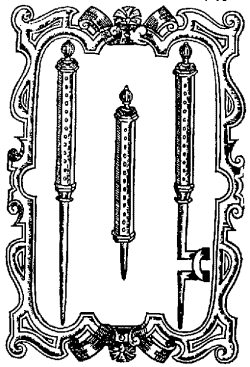Pricking
During the height of the witch trials of the 16th and 17th centuries, common belief held that a witch could be discovered through the process of pricking their skin with needles, pins and bodkins – daggerlike instruments for drawing ribbons through hems or punching holes in cloth.

This practice derived from the belief that all witches and sorcerers bore a witch's mark that would not feel pain or bleed when pricked.[1] The mark alone was not enough to convict a person, but did add to the evidence. Pricking was common practice throughout Europe, but was most prevalent in England and Scotland. Professional witch finders earned a good living from unmasking witches, travelling from town to town to perform their services. Hollow wooden handles and retractable points have been saved from these finders, which would give the appearance of an accused witch's flesh being penetrated to the hilt without mark, blood, or pain. Other specially designed needles have been found with a sharp end and a blunt end. Through sleight of hand, the sharp end could be used on "normal" flesh, drawing blood and causing pain, while the unseen dull end would be used on a supposed witch's mark.
In literature
The protagonist of Robert Neil's historical novel "Witch Bane" suffers the humiliation of falling under suspicion by bigots and being stripped naked in the marketplace of Clitheroe and pricked by an odious witch finder from Scotland.
See also
Notes
- Brian P. Levack, The Witch-Hunt in Early Modern Europe (London: Pearson, 3rd edn., 2006), ISBN 0582419018, p. 52.
Bibliography
- Brian P. Levack, The Witch-Hunt in Early Modern Europe (2nd edn., 1995)
- Gary K. Waite, Heresy, Magic, and Witchcraft in Early Modern Europe (2003)
- Robert W. Thurston, The Witch Hunts: A History of the Witch Persecutions in Europe and North America, 2nd ed. (2007)
- Joseph Klaits, Servants of Satan: the Age of the Witch Hunts (1985)
- Geoffrey R. Quaife, Godly Zeal and Furious Rage: the Witch in Early Modern Europe (1987)